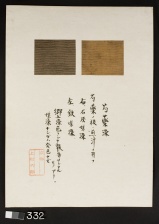Difference between revisions of "Shakuyaku (Chinese peony) - right (332 R)"
Jump to navigation
Jump to search
(username removed) |
|||
| Line 22: | Line 22: | ||
! scope="row"|Dyestuff (Japanese common name) | ! scope="row"|Dyestuff (Japanese common name) | ||
| 芍薬 : Shakuyaku | | 芍薬 : Shakuyaku | ||
| + | |- | ||
| + | ! scope="row"|Dyestuff (English common name) | ||
| + | | Chinese peony | ||
|- | |- | ||
! scope="row"|Dyestuff (botanical name) | ! scope="row"|Dyestuff (botanical name) | ||
Revision as of 17:54, 23 June 2020
| Museum number | 332 |
|---|---|
| Uemura number / title | ; "Haze-some 25" |
| Folder location | 5th shelf |
| Sample location | right (332 R) |
| Fiber type | silk |
| Color | brown |
| Dyestuff (Japanese common name) | 芍薬 : Shakuyaku |
| Dyestuff (English common name) | Chinese peony |
| Dyestuff (botanical name) | Paeonia lactiflora Pall. var. trichocarpa (Bunge) Stearn |
| Plant part | root / dried (?) |
| Dyestuff extraction | boiled in water |
| Auxiliary agent in dye bath | - |
| Mordant | lime |
| Other auxiliary agent | - |
| Uemura's notes | Regional use of this plant for dyeing has been reported. The dyestuff requires a mordant to produce a color on a fabric. |
| Uemura's date | Kyoto |
